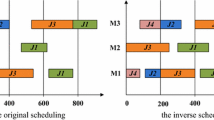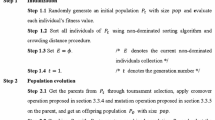Abstract
The deterioration effect in flowshop scheduling has gained a growing concern from the community of operational research in recent years. However, all of existing studies focus on two- or three-machine flow shops. In this paper, a m-machine \((m>3)\) flowshop scheduling problem (FSSP) with deteriorating jobs is investigated and a novel metaheuristic algorithm called multi-verse optimizer (MVO) is employed to solve it. The MVO algorithm can accomplish the optimization process via exchanging objects of universes through white/black hole and wormhole tunnels. In the novel MVO algorithm, a new elitist selection scheme is designed to construct the effective white/black hole tunnels, whereas two different local search operators are hybridized and embedded to further enhance the exploitation capability. Experimental results indicate that the proposed algorithm can achieve the satisfactory performance in solving the investigated FSSP with deteriorating jobs.





Similar content being viewed by others
References
Alidaee, B., & Womer, N. K. (1999). Scheduling with time dependent processing times: Review and extensions. Journal of the Operational Research Society, 50, 711–720.
Bachman, A., & Janiak, A. (2000). Minimizing maximum lateness under linear deterioration. European Journal of Operational Research, 126(3), 557–566.
Browne, S., & Yechiali, U. (1990). Scheduling deteriorating jobs on a single processor. Operations Research, 38(1), 495–498.
Costa, A., Cappadonna, F. A., & Fichera, S. (2017). A hybrid genetic algorithm for minimizing makespan in a flow-shop sequence-dependent group scheduling problem. Journal of Intelligent Manufacturing, 28(6), 1269–1283.
Cheng, T. C. E., & Ding, Q. (2001). Single machine scheduling with step deteriorating processing times. European Journal of Operational Research, 134(1), 623–630.
Cheng, T. C. E., Ding, Q., Kovalyov, M. Y., Bachman, A., & Janiak, A. (2003). Scheduling jobs with piecewise linear decreasing processing times. Naval Research Logistics, 50(6), 531–554.
Cheng, T. C. E., Ding, Q., & Lin, B. M. T. (2004). A concise survey of scheduling with time-dependent processing times. European Journal of Operational Research, 152, 1–13.
Cheng, M. B., Tadikamalla, P. R., Shang, J. F., & Zhang, S. Q. (2014). Bicriteria hierarchical optimization of two-machine flow shop scheduling problem with time-dependent deteriorating jobs. European Journal of operational research, 234(3), 650–657.
Chu, C. B. (1992). A branch-and-bound algorithm to minimize total flow time with unequal release dates. Naval Research Logistics, 39(6), 859–875.
Dao, T. K., Pan, T. S., & Pan, J. S. (2018). Parallel bat algorithm for optimizing makespan in job shop scheduling problems. Journal of Intelligent Manufacturing, 29(2), 451–462.
Fu, Y. P., Wang, H. F., Huang, M., & Wang, J. W. (2017). A decomposition based multiobjective genetic algorithm with adaptive multipopulation strategy for flowshop scheduling problem. Natural Computing,. https://doi.org/10.1007/s11047-016-9602-1.
Fu, Y. P., Ding, J. L., Wang, H. F., & Wang, J. W. (2018). Two-objective stochastic flow-shop scheduling with deteriorating and learning effect in Industry 4.0-based manufacturing system. Applied Soft Computing. https://doi.org/10.1016/j.asoc.2017.12.009.
Fu, Y. P., Wang, H. F., Tian, G. D., Li, Z. W., & Hu, H. S. (2018). Two-agent stochastic flow shop deteriorating scheduling via a hybrid multi-objective evolutionary algorithm. Journal of Intelligent Manufacturing,. https://doi.org/10.1007/s10845-017-1385-4.
Gao, K. Z., Suganthan, P. N., Pan, Q. K., Chua, T. J., Cai, T. X., & Chong, C. S. (2016). Discrete harmony search algorithm for flexible job shop scheduling problem with multiple objectives. Journal of Intelligent Manufacturing, 27(2), 363–374.
Gawiejnowicz, S., Lee, W. C., Lin, C. L., & Wu, C. C. (2011). Single-machine scheduling of proportionally deteriorating jobs by two agents. Journal of the Operational Research Society, 62, 1983–1991.
Gupta, J. N. D., & Gupta, S. K. (1988). Single facility scheduling with nonlinear processing times. Computers & Industrial Engineering, 14(4), 387–393.
He, Z. G., Guo, Z. X., & Wang, J. W. (2018). Integrated scheduling of production and distribution operations in a global MTO supply chain. Enterprise Information Systems,. https://doi.org/10.1080/17517575.2018.1428770.
Jeng, A. A. K., & Lin, B. M. T. (2005). Minimizing the total completion time in single-machine scheduling with step-deteriorating jobs. Computers & Operations Research, 32(3), 521–536.
Ji, W. B., & Zun, Q. X. (2005). Scheduling jobs under decreasing linear deterioration. Information Processing Letters, 94(2), 63–69.
Kunnathu, A. S. (1990). Minimizing the makespan with late start penalties added to processing times in a single facility scheduling problem. European Journal of Operational Research, 47(1), 56–64.
Lee, W. C., Shiau, Y. R., Chen, S. K., & Wu, C. C. (2010). A two-machine flowshop scheduling problem with deteriorating jobs and blocking. International Journal of Production Economics, 124, 188–197.
Lee, W. C., Yeh, W. C., & Chung, Y. H. (2014). Total tardiness minimizationin permutation flowshop with deterioration consideration. Applied Mathematical Modelling, 38(13), 3081–3092.
Li, X. T., & Yin, M. H. (2013). An opposition-based differential evolution algorithm for permutation flow shop scheduling based on diversity measure. Advanced Engineering Software, 55, 10–31.
Mirjalili, S., Mohammad, S., & Hatamlou, A. (2016). Multi-verse optimizer: A nature-inspired algorithm for global optimization. Neural Computing and Applications, 27, 495–513.
Mosheiov, G. (1994). Scheduling jobs under simple linear deterioration. Computers & Operations Research, 21, 653–659.
Ng, C. T., Cheng, T. C. E., Bachman, A., & Janiak, A. (2002). Three scheduling problems with deteriorating jobs to minimize the total completion time. Information Processing Letters, 81(6), 327–333.
Shiau, Y. R., Lee, W. C., Wu, C. C., & Chang, C. M. (2007). Two-machine flowshop scheduling to minimize mean flow time under simple linear deterioration. International Journal of Advanced Manufacturing Technology, 34, 774–782.
Sundararaghavan, P. S., & Kunnathur, A. S. (1994). Single machine scheduling with start time dependent processing times: Some solvable cases. European Journal of Operational Research, 78(3), 394–403.
Ta, Q. C., Billaut, J. C., & Bouquard, J. L. (2018). Matheuristic algorithms for minimizing total tardiness in the m-machine flow-shop scheduling problem. Journal of Intelligent Manufacturing, 29(3), 617–628.
Ventura, J. A., & Yoon, S. H. (2013). A new genetic algorithm for lot-streaming flow shop scheduling with limited capacity buffers. Journal of Intelligent Manufacturing, 24(6), 1185–1196.
Wang, H. F., Fu, Y. P., Huang, M., & Wang, J. W. (2016). Multiobjective optimisation design for enterprise system operation in the case of scheduling problem with deteriorating jobs. Enterprise Information Systems, 10(3), 268–285.
Wang, H. F., Fu, Y. P., Huang, M., Huang, G. Q., & Wang, J. W. (2017). A NSGA-II based memetic algorithm for multiobjective parallel non-identical flowshop scheduling problem. Computers & Industrial Engineering, 113, 185–194.
Wang, J. B., & Wang, M. Z. (2013). Minimizing makespan in three-machine flow shops with deteriorating jobs. Computers & OperationsResearch, 40(2), 547–557.
Wang, J. W., Dou, R. L., Muddada, R. R., & Zhang, W. J. (2017). Management of a holistic supply chain network for proactive resilience: Theory and case study. Computers & Industrial Engineering,. https://doi.org/10.1016/j.cie.2017.12.021.
Wang, J. W., Muddada, R. R., Wang, H. F., Ding, J. L., Lin, Y., & Zhang, W. J. (2016). Towards a resilient holistic supply chain network system: Concept, review and future direction. IEEE Systems Journal, 10(2), 410–421.
Wang, L., Pan, Q. K., & Tasgetiren, M. F. (2011). A hybrid harmony search algorithm for the blocking permutation flow shop scheduling problem. Computer Industrial Engineering, 61(1), 76–83.
Wu, C. C., & Lee, W. C. (2006). Two-machine flow shop scheduling to minimize mean flow time under linear deterioration. International Journal of Production Economics, 103, 572–584.
Wu, W. H., Wu, W. H., Chen, J. C., Lin, W. C., Wu, J. P., & Wu, C. C. (2015). A heuristic-based genetic algorithm for the two-machine flowshop scheduling with learning consideration. Journal of Manufacturing Systems, 35, 223–233.
Zhong, R. Y., Huang, G. Q., Lan, S., Dai, Q. Y., Zhang, T., & Xu, C. (2015). A two-level advanced production planning and scheduling model for RFID-enabled ubiquitous manufacturing. Advanced Engineering Informatics, 29(4), 799–812.
Acknowledgements
We would like to thank the anonymous editor and reviewers for their thoughtful suggestions and constructive comments. This paper was partially supported by National Science Foundation of China under Grants 71671032, 71571156, 61703290 and 71620107003, and Fundamental Research Funds for the Central Universities Grant N160402002.
Author information
Authors and Affiliations
Corresponding author
Rights and permissions
About this article
Cite this article
Wang, H., Huang, M. & Wang, J. An effective metaheuristic algorithm for flowshop scheduling with deteriorating jobs. J Intell Manuf 30, 2733–2742 (2019). https://doi.org/10.1007/s10845-018-1425-8
Received:
Accepted:
Published:
Issue Date:
DOI: https://doi.org/10.1007/s10845-018-1425-8




